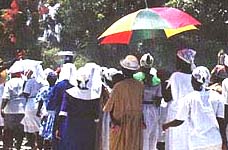
No one knows why human reactions to the virus are different. But researchers in Texas are finding in some of their laboratory animals, there may be proof the virus can embed itself and never leave.
Former Peace Corps Physiciain Robert Tesh's research team has been using hamsters to test the long-range effects of West Nile virus
West Nile virus varies
Researchers find different reactions to infection
By Robert Miller
THE NEWS-TIMES
Caption: The physician in the photo above is *not* Dr. Tesh.
Most people infected with the West Nile virus never know it.
Some get a low fever and a weeklong headache.
Others are paralyzed or have chronic fatigue that leaves them spent after walking down a sidewalk. Some have relapsing bouts of West Nile fever, and some die.
No one knows why human reactions to the virus are different. But researchers in Texas are finding in some of their laboratory animals, there may be proof the virus can embed itself and never leave.
"We've found people who get encephalitis from West Nile, then get it again six to eight months later," said Dr. Robert Tesh, speaking last week at the Connecticut Agricultural Experiment Station in New Haven "So one wonders if they still have the virus in their bodies."
Tesh is a pathologist at the Center for Biodefense and Emerging Infectious Diseases at the University of Texas in Galveston. Prior to his Texas appointment, he was a doctor in the infectious disease department at Yale New-Haven Hospital, a Peace Corps physician and a member of the staff at Gorgas Hospital in Panama.
In Texas, his research team has been using hamsters to test the long-range effects of West Nile virus. What it's found, Tesh said, is that some hamsters never develop a immune response to the virus strong enough to kill it. For up to eight months afterward, he said, researchers found the virus in some of the hamsters' kidneys and urine.
"They get infected and they stay infected," he said.
Tesh said that while no one has tested humans in a similar fashion for West Nile virus, there's some evidence that viral infections can linger in humans as well.
Tesh also said his lab has found for both hamsters and rhesus monkeys, the course of West Nile is similar to that of humans. For a week or more after infection, there's little or no physical reaction, other than a slight fever. Many of the animals then develop antibodies that attack the virus cells, and the animals recover.
But in some, he said, the virus directly attacks the brain during the second week of infection.
"It's quite specific to the neurons in the brain," he said. Encephalitis, an inflammation of the brain, occurs as a reaction to that damage. The neural damage causes some of lingering symptoms — including paralysis — that occurs in West Nile patients.
West Nile first appeared in North America in the northeastern states in the late summer of 1999. Since then, it's spread throughout the continental United States, and into Canada, Mexico and the Caribbean.
In the United States, there have been 16,637 cases of human infection with West Nile virus and 654 deaths But Tesh said it now appears the virus isn't having as much effect on humans in Mexico. Tesh said he believes this is because Mexicans have been exposed to a number of similar viral diseases — including yellow fever and dengue fever — and may have already built up an immunity to West Nile.
"I think if it moves south, we'll see fewer cases in humans," he said.
The virus has manifested itself differently in different sections of the country. In Texas, for example, it's been blue jays, not crows, that seem to be the main avian victims of the virus; there's also been a different species of mosquito spreading the disease to people.
What researchers are watching intently is whether West Nile has begun to wane across the United States. That occurred in 2004 in the Northeast. In Connecticut that year, there were profound declines in infected birds and infected mosquitoes and no human cases at all.
Theodore Andreadis, an entomologist at the agricultural experiment station, said that while it's still early in the West Nile season, there have been no infected birds, mosquitoes or humans in the state this year.
"We'll have a much better idea of this by August," Andreadis said. "But I think we're entering a new phase of this disease. I think it's in decline."
Tesh said viral diseases in the United States similar to West Nile don't provide a clue toward its future.
California encephalitis, seems to be a constant problems where it occurs.
St. Louis encephalitis, can largely disappear for a decade, then explode back on the scene.
Tesh said the environmental component of the disease can't be ignored. If regions of the country have a wet spring, then a hot summer, mosquitoes may breed readily; the more mosquitoes, the more chance of spreading West Nile.
Dr. James Hadler, director of the state Department of Public Health's infectious disease department said the state's monitoring system — which records West Nile in birds, mosquitoes and humans — will prove if the decline recorded last year will continue.
"The long-term answers to these questions are another matter," Hadler said. "I'd hate to say the worst is over."
Contact Robert Miller
at bmiller@newstimes.com
or at (203) 731-3345.












